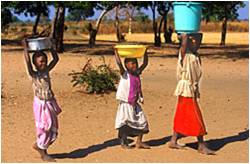 |
| Photo courtesy of bnet.com |
Do you take water for granted? Do you expect to have running water at home? Well that’s not something you should take for granted. I've lived without water for years on during the Lebanon civil war, and I can tell first-hand it made life extremely difficult.
At the moment, almost a billion people on the planet don’t have access to clean, safe drinking water. That means one-eighth of the world population is currently exposed to preventable disease, if not death, because of something that many of us fail to appreciate.
Water, the lifeblood of a nation, is being highlighted today in Blog Action Day 2010, which is an annual event held every October 15 that unites the world’s bloggers in posting about the same issue on the same day with the aim of sparking a global discussion and driving collective action. This year the issue is water.
Access to clean water is not just a human rights issue. It’s an environmental issue, an animal welfare issue and a sustainability issue. Water is a global issue that affects humanity altogether.
As at this writing, 4,437 bloggers from 133 countries are participating in highlighting the world’s most precious national resource that is indispensible for life. The White House and the UK Foreign Office will also be blogging about water on Blog Action Day today. The occasion is shaping up to be the biggest single day of action about clean water on record.
Blog Action Day brings to mind last year's Water Bucket Walk, when the UAE charity Dubai Cares invited the community to participate in the six-kilometer walk in support of children globally who do not have access to clean drinking water in schools.
Dubai Cares is a philanthropic establishment launched in September 2007 by His Highness Sheikh Mohammed Bin Rashid Al Maktoum, Vice President and Prime Minister of the United Arab Emirates and Ruler of Dubai, with the aim of improving access to primary education for children in developing countries.
 |
| Photo courtesy of Dubai Cares |
According to Dubai Cares, children in developing countries walk on average more than six kilometers every day to collect polluted water that is likely to make them sick. The time spent daily collecting water can be quite lengthy, thus preventing many children from attending school.
Dubai Cares reports that children tend to leave their houses prior to sunrise to collect water. Once at a water source, they may queue for hours and, when they get their turn, the water may be so shallow that it would take them hours to scoop it into buckets. In addition, the water they scoop is often dirty and highly contaminated. These children then have to walk long and exhausting distances back to their houses carrying heavy buckets on their shoulders or heads.
 |
| Photo courtesy of Dubai Cares |
According to the charity :
- The average distance children in Asia and Africa have to walk to collect water is six kilometers (3 hours).
- Children miss 443 million schooldays every year due to contaminated water.
- Some 104 million children worldwide receive no education at all. Poor access to safe water and sanitation is a key cause.
- Most often it is the women and children who have to find water each day.
- Children miss school because they are walking long distances with buckets full of water that are not even safe enough to drink.
- Providing water, sanitation and hygiene reduces diarrheal deaths by 65 percent.
- The simple act of washing hands with soap and water reduces diarrheal diseases by over 40 percent.
- Providing access to potable water within a one-kilometer range could create 320 million productive working days.
 |
| The Water Bucket Walk in Dubai (Dubai Cares) |
The Water Bucket Walk, which took place on Dubai’s Jumeirah Beach Road, gave the community an opportunity to walk for a cause and experience a degree of the difficulties that children in developing countries tend to face with the burden of having to gather water for their families on a daily basis. The entry fee of AED 30, or $8, provided one child with clean drinking water for one year!
We can make a difference for as little as that...
(Please take a moment to sign the petition above and support UN efforts to bring clean, safe water to millions. You can also visit change.org to join the discussion)
